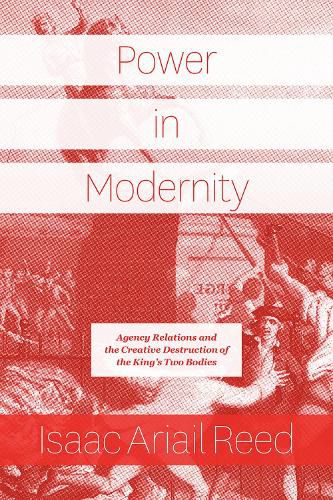Readings Newsletter
Become a Readings Member to make your shopping experience even easier.
Sign in or sign up for free!
You’re not far away from qualifying for FREE standard shipping within Australia
You’ve qualified for FREE standard shipping within Australia
The cart is loading…






In Power in Modernity, Isaac Ariail Reed proposes a bold new theory of power that describes overlapping networks of delegation and domination. Chains of power and their representation, linking together groups and individuals across time and space, create a vast network of intersecting alliances, subordinations, redistributions, and violent exclusions. Reed traces the common action of sending someone else to do something for you as it expands outward into the hierarchies that control territories, persons, artifacts, minds, and money.
He mobilizes this theory to investigate the onset of modernity in the Atlantic world, with a focus on rebellion, revolution, and state formation in colonial North America, the early American Republic, the English Civil War, and French Revolution. Modernity, Reed argues, dismantled the King’s Two Bodies -the monarch’s physical body and his ethereal, sacred second body that encompassed the body politic-as a schema of representation for forging power relations. Reed’s account then offers a new understanding of the democratic possibilities and violent exclusions forged in the name of the people, as revolutionaries sought new ways to secure delegation, build hierarchy, and attack alterity.
Reconsidering the role of myth in modern politics, Reed proposes to see the creative destruction and eternal recurrence of the King’s Two Bodies as constitutive of the modern attitude, and thus as a new starting point for critical theory. Modernity poses in a new way an eternal human question: what does it mean to be the author of one’s own actions?
$9.00 standard shipping within Australia
FREE standard shipping within Australia for orders over $100.00
Express & International shipping calculated at checkout
In Power in Modernity, Isaac Ariail Reed proposes a bold new theory of power that describes overlapping networks of delegation and domination. Chains of power and their representation, linking together groups and individuals across time and space, create a vast network of intersecting alliances, subordinations, redistributions, and violent exclusions. Reed traces the common action of sending someone else to do something for you as it expands outward into the hierarchies that control territories, persons, artifacts, minds, and money.
He mobilizes this theory to investigate the onset of modernity in the Atlantic world, with a focus on rebellion, revolution, and state formation in colonial North America, the early American Republic, the English Civil War, and French Revolution. Modernity, Reed argues, dismantled the King’s Two Bodies -the monarch’s physical body and his ethereal, sacred second body that encompassed the body politic-as a schema of representation for forging power relations. Reed’s account then offers a new understanding of the democratic possibilities and violent exclusions forged in the name of the people, as revolutionaries sought new ways to secure delegation, build hierarchy, and attack alterity.
Reconsidering the role of myth in modern politics, Reed proposes to see the creative destruction and eternal recurrence of the King’s Two Bodies as constitutive of the modern attitude, and thus as a new starting point for critical theory. Modernity poses in a new way an eternal human question: what does it mean to be the author of one’s own actions?